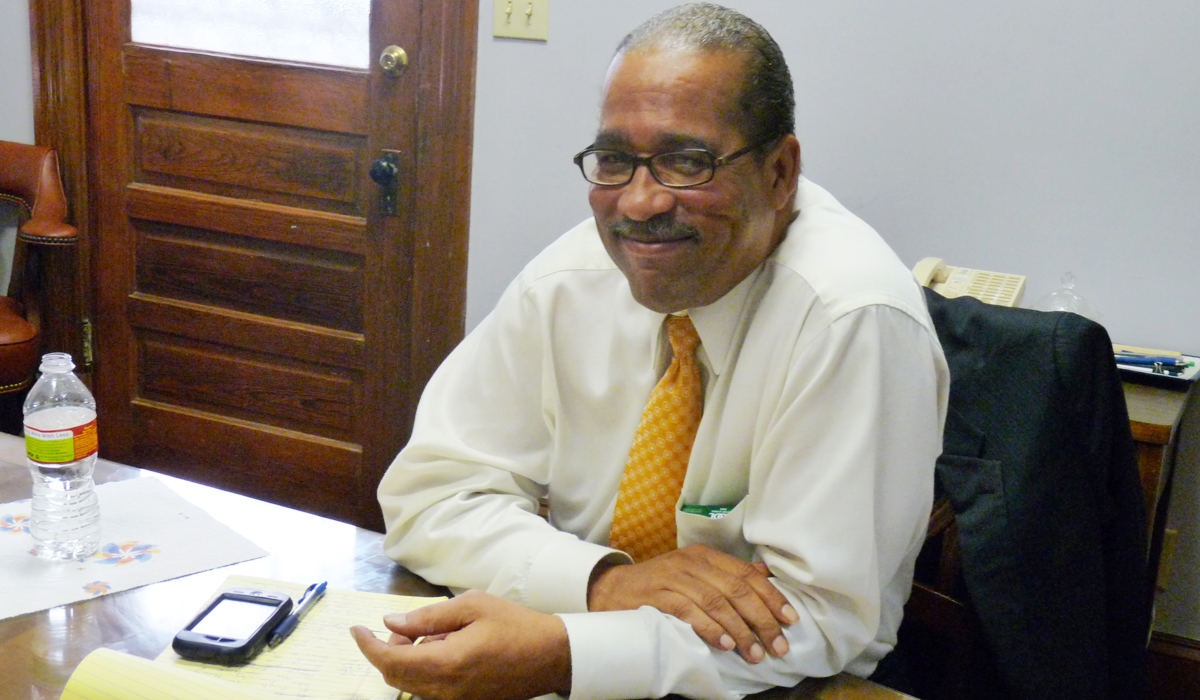
Hinds County District Attorney Robert Shuler Smith walked into the courtroom on March 3, 2016, with a clear goal—to help get Christopher Butler, then 38, out of the Raymond jail.
Smith showed up in Hinds County Judge Melvin Priester Sr.'s courtroom, even though he was not one of the prosecutors of record in State of Mississippi vs. Christopher Butler, in which the state attorney general had arrested Butler in January for embezzlement and wire fraud that he allegedly committed while working as a sales manager at Mega Mattress in west Jackson. The State contends that Butler falsified invoices for more than $500 to a Florida finance company. He was in the Hinds County Detention Center with a $500,000 bond and is considered a habitual offender due to past convictions.
In a separate county case, Butler is also facing drug charges for possessing more than an ounce of marijuana from earlier arrests. The Mississippi Bureau of Narcotics had arrested him for the most recent drug charges in 2012, which fell to Smith's office to prosecute. With Butler out on bail for those charges, the old case has yet to go to trial; Smith attempted to delay the trial and then tried to drop the charges because, the DA claims, he has evidence that can clear Butler.
But the case this March day before Priester was for a white-collar crime not connected with the drug arrests. Still, the DA jumped in as soon as Judge Priester told Butler's attorney, Sanford Knott, to move ahead with his motions to bar the attorney general from trying a case in Smith's jurisdiction.
"I'm sorry. Let me interrupt for one second," Smith said before Knott could answer Priester. The DA then added, "Your Honor, I think the AG's office is here to present the case against Mr. Butler. And I personally would like to know what that is. I mean, I'm not trying to interfere with the proceedings. I'm just wanting to see what this is about."
The judge seemed taken aback. "Personally, you would like to know what?"
"What the evidence is. I think they are here to present evidence in this case," Smith answered.
"And you obviously have a problem with this?"
"Well, we'll get to—yes, sir."
Smith, elected as district attorney last fall for the third time, actually has two problems with Butler's situation: He doesn't want the attorney general to try him in his jurisdiction for the white-collar crime, and he doesn't believe Butler is guilty of the earlier drug crime, arguing that the State of Mississippi, working with some local judges, is setting him up.
Priester then threw the mic back to defense attorney Knott, who shared the same concern as prosecutor Smith, arguing that Hood's office could not intervene, or go around the DA, as he and Smith believe the attorney general is trying to "overrule the district attorney's office."
And, in effect, they are. The State, working with the FBI, wants Butler prosecuted—and perhaps his testimony implicating the district attorney—and Smith wants him to go free.
Rather desperately, it seems.
'Cloak and Dagger Issues'
Throughout the exchange in Priester's courtroom in March, Smith was "irrational, manic and virtually out of control," as the judge told the Mississippi Bar later. The 45-year-old prosecutor could not stand still and kept moving back and forth from the seat to the podium, and then would stand up and down in his seat as other attorneys talked to the judge, all activity considered inappropriate and disruptive in courtroom settings.
When Smith got a chance to speak, he insisted that Shaun Yurtkuran and Patrick Beasley of the AG's office, who had worked for him as assistant district attorneys in his first two years as DA starting in 2008, knew that Butler had been framed for the drug charges. With the two men listening, Smith promised that the Mississippi Bureau of Narcotics had a videotape that could clear Butler. "And that videotape was seized by that agency and obstructed justice so that no one would see what was on that videotape, which would show that Mr. Butler was framed twice," Smith told Priester.
"They know that."
The judge wasn't buying it, though. "Well, I personally take issue with that in that I sat through watching that video for approximately 12 to 16 hours, and there was nothing to show," Priester answered.
"Well, we have an expert who corroborates the fact that it was tampered with," Smith returned.
"Well, that's a little different from what you said," Priester answered, referring to Smith's previous statement that the contents of the tape would clear Butler.
From there, the hearing transcript shows that Smith kept promising that he could clear Butler, presumably of the drug charges, and continued to make allegations against the AG's attorneys in the courtroom. "I can prove every last one of them. Yes, sir," Smith promised at one point about his accusations, after interrupting the judge.
"Fine," Priester answered. "But you know what? I don't care. ... I don't care what you feel you can prove. What I care about is that there's an initial appearance scheduled for today on this defendant for specific charges.
"And I'm not going to inject myself into the cloak and dagger issues ... . That's way over my pay grade. OK."
Eleven days later, on March 14, Priester filed a report with the Mississippi Bar Association describing Smith's frantic behavior. The judge said he was attaching the transcript, although it could not fully show the "emotional flavor" of Smith's actions. He regretted having to file the report, he said, adding that "Mr. Smith's behavior was so bizarre, I am required to do so."
'Straight from New Orleans'
Within three months, on June 22, the attorney general's office indicted Smith as well, with several men in business suits, including AG investigator Leland McDivitt, showing up at the DA's office on the top floor of the Hinds County Courthouse to arrest him. The charges, which came through affidavit rather than grand-jury indictment, charged that the DA "did willfully and unlawfully consult, advise and counsel" two men under indictment, Butler and long-time Smith associate Darnell Turner—often called "ex parte" communication in the legal world.
Five of the six counts charge Smith with trying to help Butler beat both his drug and wire-fraud/embezzlement charges and get out of jail, with much of the alleged "ex parte" activity happening since that "erratic" March day in Priester's courtroom.
In Butler's case, the affidavit accused Smith of visiting Butler on May 9 and again on May 26 in jail, supported by copies of the jail's visitation logs, and of sending Sanford Knott a May 21, 2016, letter advising the defense attorney "of various ways to attack the State's pending case against Mr. Butler." The attorney general contended that Smith met with Butler's family between Jan. 14 and June 20 of this year, referred to Butler as "his client" and worked with defense counsel to get him released.
It also accused him of trying to retain additional defense counsel for Butler.
On Aug. 12, 2016, the attorney general alleged in court filings that his office and the FBI have Smith on tape telling a confidential informant that he was lining up high-powered Tupelo attorney Jim Waide to help Butler. "So we got Jim Waide," Smith allegedly told the informant.
The filing said Smith added to the informant that "(Waide) came down here straight from New Orleans when I called him." Smith also allegedly told the informant: "Oh, we going to get (Butler) free now between me and Waide and all that, and then Dennis is doing his thing on the other one."
That likely means Dennis Sweet III, who is representing Darnell Turner, 39, a former campaign worker for Smith who is charged in several cases, indictments show: with aggravated assault for allegedly hitting Anthony Steel in the head with a gun; shooting at Anthony Young; and domestic violence against former girlfriend Kimberly Anderson. The AG also charged Smith with giving emails between the State, DA and the county judge to Sweet to help with his defense of Turner, who the Hinds County Sheriff's Department said is also known as "Darnell Dixon."
Because Waide is now defending Smith against the June 22 charges that he is trying to help Butler, Hood's Aug. 12 motions sought to remove the Tupelo attorney from the DA's case due to a conflict of interest.
Waide responded to Hood's revelation that a confidential informant had taped the DA by filing a motion revealing the informant's name—Ivon Johnson—and demanded that the State produce both Johnson and the secret tapes at an Aug. 18 hearing, which has since been postponed until the matter of the sealed documents can be resolved. Johnson is the former assistant district attorney under Smith who took a plea deal for federal charges for allegedly taking a bribe from Rev. Robert "Two Sweet" Henderson, 44, on behalf of unnamed defendants, who was then arrested on July 29.
As the Jackson Free Press reported recently, Henderson has long been connected to high-powered men in Jackson, including former Mayor Frank Melton and former Councilman Frank Bluntson. Gov. Haley Barbour pardoned him of his previous crimes in 2011, based in part on recommendations by now-former Hinds County Sheriff Tyrone Lewis and DA Smith.
Johnson had apparently recorded Smith's comments about Butler and Waide—which the prosecution argues disqualifies Waide from representing Smith, as Waide might be called as a witness. Waide said in an Aug. 17 motion that the same information that would be obtained from him could be found in testimony by Johnson or Butler but stated that both men seemed to be missing and that the State was holding them both in undisclosed locations.
However, Special Judge James D. Bell delayed the hearing, saying that a grand jury was likely to convene related to the cases, and that nothing "urgent" needed to happen that warranted a hearing before then.
Recent filings also announced that all Hinds County judges have now recused themselves from handling the case against the man who tries cases in their courtroom; the special judge, of Brandon, is handling the case against Smith.
Bell, incidentally, published a novel, "Vampire Diaries," published by Sartoris Literary Group in Jackson. His protagonist, a trial attorney, takes on the "Butcher of Belhaven" in the novel.
Letters from the Raymond Jail
Through all the legal "cloak and dagger," to use Judge Priester's phrase, Christopher Dale Butler has sat in the less-than-inviting Raymond jail writing letters to try to get himself out of it. He wrote a handwritten letter to a "Mr. Wallace" last February, stating, "We're come a long way from 833, huh? But let me get to the point" (Lanier High School is at 833 Maple St.; many graduates thus call it "833.")
Hinds County Circuit Clerk Zack Wallace told the Jackson Free Press on Aug. 29 that he receives lots of mail from inmates and does not know Butler personally.
Butler said he was caught up because the store he worked for—Mega Mattress—allowed people to finance purchases without a credit check or any money down.
"So you know how that goes," he wrote, then continued, "But anyway, they are trying to charge me for those peoples wrongs of not paying for their bill every month (sic)," Butler wrote. "Like I influence them not to pay. I know that there isn't much you can do personally but I need help getting back on the court docket for a bond reduction. This half of a million is stupid. It's people that's down here with murder charges with cheaper bonds."
"[T]he condition that they have us under here in Raymond is unhuman," Butler wrote to Wallace. "No mats, no towels, medical slow, it's cold, and they give us one blanket sleeping on metal. If there is anything you can do, Mr. Wallace, anything that's within your power, please help me. This treatment isn't for any man especially a good guy. These charges are nonsense!!!"
It doesn't help Butler's case for a lower bond that he is considered a habitual offender. Starting in 1996, he was arrested for a series of drug possession and sales crimes, and then motor-vehicle theft from J.D. Quality Cars on West Northside Drive in 1999, then cocaine possession again in 2002, a case that was dropped after he paid a $5,000 bond, records show.
It wasn't until 2012 that Butler was arrested again for possession of more than an ounce of marijuana after the Mississippi Bureau of Narcotics investigation; his then-girlfriend Kwanza Hilliard was listed as a co-defendant. He put up a $10,000 bond and went home. That is the case that Smith promised Judge Priester he can prove was an MBN set-up of Butler, but until Aug. 15, that evidence was pretty much hidden from public view.
Finding the Marijuana
Josh Ledford asked the Mississippi Bureau of Narcotics officer several times if he could check on his 14-month-old daughter, who sat crying in the backseat of his truck, as he stood handcuffed in front of Christopher Butler's house in on April 19, 2011.
"They were questioning me about do I know who Mr. Butler is, or do I know the name of the individual that lives at the house," Ledford said in an interview transcript that was sent to the Mississippi Bar on Aug. 15. It was attached to Waide's response to counter Judge Melvin Priester Sr.'s complaint that Smith had acted "erratically" in his courtroom during a March 3, 2016, hearing with the AG's office about Butler's 2016 white-collar charges.
The transcripts were among documents that for the first time publicly details Smith's promised evidence that the State had framed Butler during drug busts in 2011 and 2012, which Smith had alluded to in Priester's courtroom. Waide's office had transcribed the recording Smith provided, he told the Jackson Free Press.
Ledford is a white male from Pearl who happened to visit Butler's house in south Jackson, back when the accused lived with Hilliard, on the same day MBN raided it after a tip from a confidential informant that Butler was selling drugs out of his girlfriend's home. Ledford had a pocketful of cash when he arrived because he had just cashed his check, he told the interviewer.
"So as I parked, I proceeded to get out of the vehicle, going to the back—it's a four-door truck. I went to the back door on the driver's side to get my daughter out, and I heard an individual kind of, you know, running, stepping, talking about freeze, freeze, pistol drawn," Ledford said.
Ledford said he had visited the house, which he said he had previously helped do work on, that morning to pick up a birthday present for his little girl. His then-wife and Hilliard both gave birth in the same hospital and had become friends during their time together, he said.
The agents detained him, searching him, finding an undisclosed amount of cash, and running his identification, he claims. The cash raised the officers' suspicion that he was there to buy drugs, and he asked the unnamed agent to let him get his daughter from the back, where she sat crying. Eventually, the officer let him go over next to the car, then finally let him get her out of the car. The officer led the father and daughter into the house.
In the house, Ledford said the police berated him, asking if he knew of any secret compartments in the house. As he was being questioned, Ledford said he could see police "scurrying" about the house.
Ledford states that although drug dogs went through the house, they never hit on anything. He said that while he was there during the search, he never saw any marijuana or drugs, although the police questioned him often about whether Butler had any hiding spots.
Butler's friend also accused the agents, only one of whom Ledford said was black, of throwing around the n-word liberally, including about Butler, who is black.
What the 10 MBN agents didn't know, Ledford said, is that Butler and Hilliard had 15 cameras installed in the house. Those 105 hours of videotapes, Smith maintains, prove that Butler was set up. The attached timeline of the tape states that the forced entry of the house took place at 12:32. Shortly thereafter, at 12:41, "an officer goes straight to the (ottoman) in the foyer, lifts the cover and finds the marijuana."
The officers then removed the marijuana, and throughout this time, Ledford and his daughter remained in the kitchen, where he was questioned for the next 30 minutes, or so he told the unnamed interviewer. Ledford states that the officers continued looking through the house, finding what he said appeared to be wrapped up money.
MBN spokeswoman Delores Lewis told the Jackson Free Press that, at the moment, the Hinds County District Attorney's office still has the recordings from Butler's house. And she strongly disputed the allegations that MBN agents framed Butler.
"The allegations made by Hinds County District Attorney Robert Shuler Smith regarding wrongdoing on the part of MBN agents are blatantly and patently false," MBN said in a written statement to the Jackson Free Press about the allegations. "Mr. Smith began making these allegations as early as January of 2015. Yet, strangely enough, he has continued to allow cases to be presented and indicted in his judicial district by the same agents that he accuses of criminal acts."
"The District Attorney has never produced the video that would support his allegations, not even after being ordered to do so by a judge in May of 2015," the statement continues.
"MBN agents are professionals, highly trained in acquiring search warrants that lead to seizures of illegal narcotics and narcotics paraphernalia. Because the agency has not received any credible evidence of wrongdoing on the part of its agents, the MBN stands by them. And we are confident that the investigation of the charges against Robert Shuler Smith will absolve them of any wrongdoing."
Waide's Bar response also revealed more handwritten jailhouse letters from Butler, trying to gain his freedom.
"I don't claim to be some innocent guy that has never done anything wrong but I do believe in justice and that justice should be fair," Butler wrote in a letter to an unnamed recipient. "If I'm being prosecuted for some thing it should be for that and that only. Not for what you and anyone else feel that I wasn't prosecuted in my past."
Stokes, Please Help
On May 6, 2016, Butler wrote one of his letters to Ward 3 City Councilman Kenneth Stokes, asking for his help. In that letter, Butler indicated to the man who represents Georgetown, where Butler grew up and still lives, that he is a pawn stuck in the middle of a battle between the State of Mississippi and Hinds County and that his constitutional and civil rights are being violated. "I was set up and framed by the MBN back about 5 years (in the 2012 arrests), and Robert Smith, Hinds County DA, found evidence of that. With that information he decided to file a motion to dismiss and my lawyer did also," Butler wrote to Stokes.
Hinds County Circuit Judge Jeff Weill did not dismiss the case, however, denying Smith's motions on May 8, 2015.
Butler said that 10 days after he appeared in Weill's courtroom, he was picked up for alleged fraud and false pretense from his job at Mega Mattress. The first thing the AG investigators asked him about, he said: "What is your relationship with the Hinds County DA?"
"They said if I tell them then all charges would be dropped, but if I don't then they would set a bond so high that I couldn't make bond and they would come with new charges," Butler wrote to Stokes. (County records show that he was indicted for two counts for the alleged Mega Mattress activity in April 2016 and another four counts a month later.)
In his letter to Stokes, as well as others, Butler maintained that he is in no way close to DA Smith. "I've only mete (sic) him in court," he said. "I'm stuck in jail with a ridiculous bond and some ridiculous charges only because the A.G. office and the D.A. office has an issue with each other." He said he was enclosing a letter from Smith proving his rights are being violated.
Butler ended by pleading for help. "I'm losing everything I earn in my life," he wrote. "I have custody of my kids, and my 73-year-old mom is with me. I don't want to lose my home. That's all we got. Please help me."
On July 27, not long after Smith's arrest, Stokes' wife, Hinds County Court Judge Larita Cooper-Stokes, went behind closed doors with the DA, his attorney Waide, three attorneys from the AG's office, a county staff attorney and a bailiff, and gave them copies of the letter.
"[W]e think under Canon 3 of the Code of Judicial Conduct that the Court should recuse herself from the case," AG attorney Bob Anderson said.
The transcript of the meeting indicates that the DA's attorney wanted Cooper-Stokes to stay on the case. "It is inconceivable that any judge in Mississippi would not have some knowledge about the substance of what is going on here," Waide said. Because the records were being sealed "for some reason," he said, "it has never been clear exactly what is going on, but the heart of it is this ... they are claiming Mr. Smith is inappropriately advising—illegally advising Mr. Butler."
Waide then waded back into what Smith had tried to talk about in Priester's courtroom back in February. "The other side of this, which has never been disclosed, is Mr. Smith's evidence that he has gathered and his assistants have gathered that drugs were possibly planted on Mr. Butler, a very serious matter, on two different occasions, once at his home and again in an Avalanche truck."
The truck incident had occurred a year later in April 2012, Waide's Bar exhibits showed. He included affidavits from brothers Stanley and James Earl Smith, who both put drugs in a black backpack that they dropped into the bed of Butler's Chevrolet Avalanche when they saw police coming down the road. Butler, they both testify, drove off before they could remove the drug-laden bag.
"I later learned that Christopher Butler was stopped, and the police found the bag in the back of the truck," Stanley Smith said in his April 13, 2012, statement. "I am very sorry that this has happened but I must be responsible for my property."
Waide then implied that Smith was arrested to try to stop him from blowing up the State conspiracy. "Mr. Smith was arrested the day before he was about to make a presentation to the grand jury essentially concerning the Butler matter," Waide said. He also said that the AG did not indict Smith but arrested him by affidavit—a choice Smith is challenging in court filings.
Former Mississippi Supreme Court Justice Oliver Diaz Jr. said during an Aug. 23 interview that if the AG is trying to cut Smith off at the pass, they might be overstepping their authority.
"Yeah, it is something that doesn't come up very often or ever has come up before," Diaz said. "It seemed like if that were the case, the proper procedure would have been, if Smith had already done something wrong, to go ahead and get the indictment."
"I think that they are trying to act peremptorily, and they don't have that authority is the problem," Diaz said.
Still, Cooper-Stokes recused herself, as have the other Hinds County court judges, leaving the case in the hands of Judge Bell, the novelist in Brandon.
Call My Mom, Please
The day after Judge Cooper-Stokes recused over Butler's letter, the Mississippi Bar Association filed a complaint against the district attorney, revealing another handwritten note—this one written by Smith and slipped under the door of a different judge back in February, asking her to call his mother.
The Feb. 9, 2016, note to Hinds Senior Circuit Judge Tomie Green was short and sweet: "Judge Green, I am trying to set an appointment for my mother, Alice Smith. She would like to speak to you about some matters. Thanks. Robert S. Smith."
Smith's maternal context is important to explain the setting for the note. Alice Thomas Smith is a well-connected, strong-willed woman, who helped Smith run his defense law firm in the Washington Addition, and then was a primary driver of his initial campaign for district attorney, often taking calls on behalf of the campaign. She helped raise Robert Smith's son after his mother returned to her native country outside the U.S., and it is her and his father's Jackson home that the DA lists as his primary address on campaign reports.
The note came under the door after Smith had fired back at the attorney general's investigation of Butler, and presumably his role in that case, by filing subpoenas for some of Hood's staff to appear before a grand jury. Green told the Mississippi Bar in a Feb. 24, 2016 (misdated 2015), that the attorney general, as well as the Mississippi Department of Corrections head Marshall Fisher, formerly of MBN, were challenging the subpoenas.
Green had appointed Amy Whitten as a special master over the case, and "[t]he DA attempt(ed) to contact and harass her."
Thus, Green "issued a clarification order prohibiting ex parte contact by him or any other party. He never ceased," Green told the Mississippi Bar.
Then, the afternoon of Feb. 9, 2016, Smith apparently slipped the note about his mom under her office door. "I know of his mother but have no personal relationship with Alice Smith," she wrote. "I emailed him to let him know the note and request was odd and improper." That evening, she emailed Smith about the note. "... I am puzzled about why you would want me to meet with your mother. Such a request is quite odd, to say the least." And, she added, it is "improper" for to meet with his mom "about specific or unspecified matters."
The next day, the DA's mother left a voicemail for Green. "She was a bit irate and demanded respect, and said she knew 'what to do.'" Green did not call her back, opting instead to alert the Mississippi Bar and the Mississippi Supreme Court.
In his response to the Bar on Smith's behalf, Waide dismissed the communication. "Smith's note to Judge Green was not related to any pending case," he wrote.
"It was written because Smith's mother had requested to meet with Judge Green, since she wanted Smith and Judge Green to 'get along.'" Waide did not address the phone call directly.
The Butler Matter
Two days later, Smith held a press conference accusing Green of improper communications with former Hinds County District Attorney Faye Peterson, who is now a defense attorney.
Peterson, who was not available for comment, and Smith have a rocky history; he defeated her in 2007 in his campaign supported by former District Attorney Ed Peters and then-Mayor Frank Melton; Peterson had indicted and tried Melton for carrying firearms illegally and for leading his bodyguards and teenagers to destroy a duplex in the Virden Addition with sledgehammers. Smith successfully defended one of Melton's bodyguards in the trial.
Ironically, it was Melton who held press conferences lambasting Peterson while she was investigating him, including having a young felon he was supporting, Christopher Walker, spread rumors about her sex life in 2006.
Green was furious about Smith's press conference. "Your conduct was intentional, retaliatory and improperly coercive at a time when I had under advisement an issue dealing with the impropriety of subpoenas you issued. ... I demand that you publicly retract your allegations...," the judge wrote to the district attorney in a hand-delivered letter on Feb. 17, 2016.
The judge added, "Further, I demand that you retract accusations that I dismissed criminal cases 'behind your back.'" She named several professional and ethical rules that he had violated, in her opinion.
"I charge that your actions were also unethical as district attorney. You were deceptive and dishonest."
Smith has made no public retraction of his accusations of Green or Peterson and has not returned messages left for comment for this story. Waide, however, told the Bar that Smith's press conference was legitimate. "Smith admits that he did have a press conference because the public has a legitimate interest in knowing about unlawful conduct," Waide wrote to the Bar.
On July 26, the Mississippi Bar filed a formal complaint about Smith through the Mississippi Supreme Court. The Bar's general counsel, Adam B. Kilgore, cited Smith's behavior in Priester's courtroom in March as part of "the Butler matter" as the first count.
The second was Smith's actions with Judge Green. Both instances, the Bar said, involved disrupting a tribunal and ex parte communication; in Green's case, Smith acted in ways that could materially prejudice a court proceeding and made statements about Green "that the lawyer knows to be false or with reckless disregard as to its truth or falsity concerning the qualifications or integrity of a judge," Kilgore stated in the Bar complaint.
But how far can a DA go to pursue justice? Diaz said that the system gives the DA "a great deal of discretion," especially whether or not to prosecute, but that in this case, the test for whether Smith's actions are warranted does not exist.
"There's not a lot of tests of that. Most people don't even walk up to that line," Diaz said. "So it is very rare and unusual that this allegation is even being made."
In the meantime, Christopher Butler's location is unknown as the cloak-and-dagger drama unfolds around him, leaving the open question of whether he will be the next witness the attorney general tries to bring forward against Smith. His latest charge came on Aug. 18 for possessing a black Tracfone cell phone while incarcerated there. The indictment cited his two earlier felony convictions for selling and possessing cocaine.
Butler says, through his letters, that he just wants to go home.
"Does not justice work both ways?" Butler wrote. "Is a person not innocent until proven guilty? I ask these questions because for some reason in Mississippi just because you are arrested for a crime that some how you must be guilty. As if the police couldn't have gotten it wrong. Or as if there isn't a thing called corruption."
CORRECTION: This story originally referred to "Sheriff Tyrone Hendrix," not Sheriff Tyrone Lewis. It has been corrected above. We apologize for the error.
Follow the ongoing DA saga at jfp.ms/DAFiles. Email tim@jacksonfreepress.com and donna@jacksonfreepress.com with info.
See more at:
What Is Case No. 16-120?
The Legacy of Williams v. State
What the Heck is ‘Ex Parte’?















